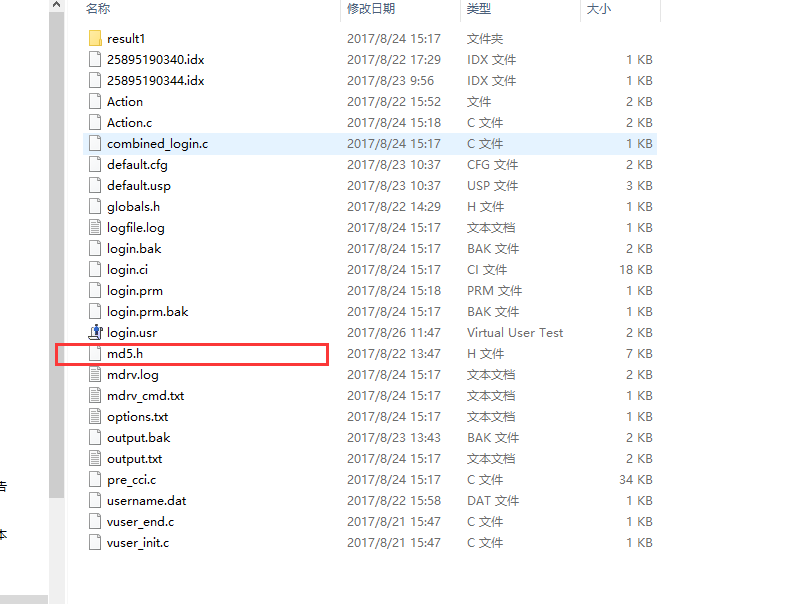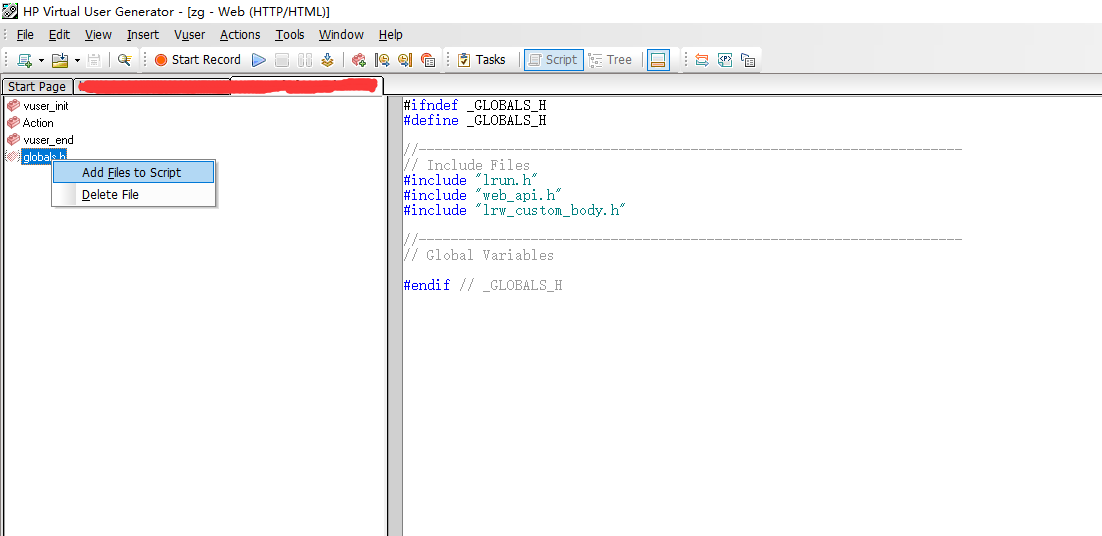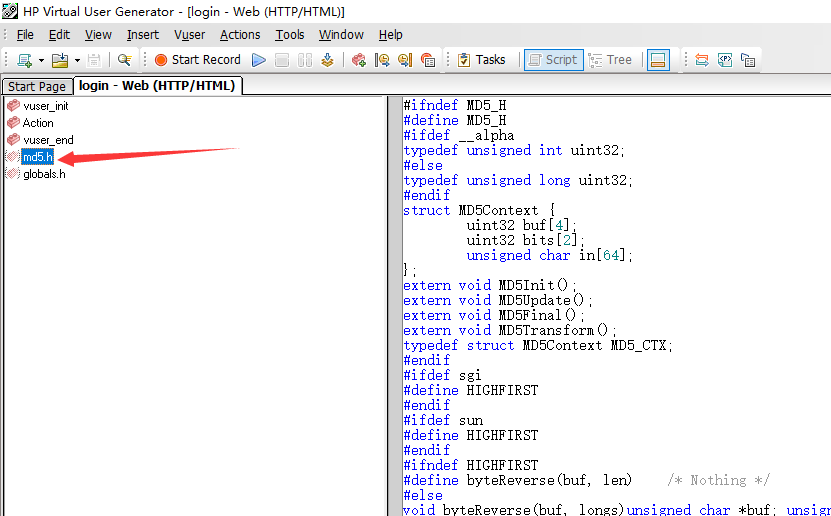最近在用loadrunner做一个压力测试,在编写脚本的时候发现传递参数的时候需要一个sign值,这个值是将参数进行MD5加密生成的,所以下面就说一说怎么对参数进行MD5加密。
1、首先我们需要一个加密算法的文件叫做:md5.h文件
我们可以新建一个md5.h文件,至于里面具体的算法网上都有下载,具体如下(直接将下面的算法拷贝到md5.h文件中):
#ifndef MD5_H
#define MD5_H
#ifdef __alpha
typedef unsigned int uint32;
#else
typedef unsigned long uint32;
#endif
struct MD5Context {
uint32 buf[4];
uint32 bits[2];
unsigned char in[64];
};
extern void MD5Init();
extern void MD5Update();
extern void MD5Final();
extern void MD5Transform();
typedef struct MD5Context MD5_CTX;
#endif
#ifdef sgi
#define HIGHFIRST
#endif
#ifdef sun
#define HIGHFIRST
#endif
#ifndef HIGHFIRST
#define byteReverse(buf, len) /* Nothing */
#else
void byteReverse(buf, longs)unsigned char *buf; unsigned longs;
{
uint32 t;
do {
t = (uint32) ((unsigned) buf[3] << 8 | buf[2]) << 16 |((unsigned) buf[1] << 8 | buf[0]);
*(uint32 *) buf = t;
buf += 4;
} while (--longs);
}
#endif
void MD5Init(ctx)struct MD5Context *ctx;
{
ctx->buf[0] = 0x67452301;
ctx->buf[1] = 0xefcdab89;
ctx->buf[2] = 0x98badcfe;
ctx->buf[3] = 0x10325476;
ctx->bits[0] = 0;
ctx->bits[1] = 0;
}
void MD5Update(ctx, buf, len) struct MD5Context *ctx; unsigned char *buf; unsigned len;
{
uint32 t;
t = ctx->bits[0];
if ((ctx->bits[0] = t + ((uint32) len << 3)) < t)
ctx->bits[1]++;
ctx->bits[1] += len >> 29;
t = (t >> 3) & 0x3f;
if (t) {
unsigned char *p = (unsigned char *) ctx->in + t;
t = 64 - t;
if (len < t) {
memcpy(p, buf, len);
return;
}
memcpy(p, buf, t);
byteReverse(ctx->in, 16);
MD5Transform(ctx->buf, (uint32 *) ctx->in);
buf += t;
len -= t;
}
while (len >= 64) {
memcpy(ctx->in, buf, 64);
byteReverse(ctx->in, 16);
MD5Transform(ctx->buf, (uint32 *) ctx->in);
buf += 64;
len -= 64;
}
memcpy(ctx->in, buf, len);
}
void MD5Final(digest, ctx)
unsigned char digest[16]; struct MD5Context *ctx;
{
unsigned count;
unsigned char *p;
count = (ctx->bits[0] >> 3) & 0x3F;
p = ctx->in + count;
*p++ = 0x80;
count = 64 - 1 - count;
if (count < 8) {
memset(p, 0, count);
byteReverse(ctx->in, 16);
MD5Transform(ctx->buf, (uint32 *) ctx->in);
memset(ctx->in, 0, 56);
} else {
memset(p, 0, count - 8);
}
byteReverse(ctx->in, 14);
((uint32 *) ctx->in)[14] = ctx->bits[0];
((uint32 *) ctx->in)[15] = ctx->bits[1];
MD5Transform(ctx->buf, (uint32 *) ctx->in);
byteReverse((unsigned char *) ctx->buf, 4);
memcpy(digest, ctx->buf, 16);
memset(ctx, 0, sizeof(ctx));
}
#define F1(x, y, z) (z ^ (x & (y ^ z)))
#define F2(x, y, z) F1(z, x, y)
#define F3(x, y, z) (x ^ y ^ z)
#define F4(x, y, z) (y ^ (x | ~z))
#define MD5STEP(f, w, x, y, z, data, s) ( w += f(x, y, z) + data, w = w<<s | w>>(32-s), w += x )
void MD5Transform(buf, in)
uint32 buf[4]; uint32 in[16];
{
register uint32 a, b, c, d;
a = buf[0];
b = buf[1];
c = buf[2];
d = buf[3];
MD5STEP(F1, a, b, c, d, in[0] + 0xd76aa478, 7);
MD5STEP(F1, d, a, b, c, in[1] + 0xe8c7b756, 12);
MD5STEP(F1, c, d, a, b, in[2] + 0x242070db, 17);
MD5STEP(F1, b, c, d, a, in[3] + 0xc1bdceee, 22);
MD5STEP(F1, a, b, c, d, in[4] + 0xf57c0faf, 7);
MD5STEP(F1, d, a, b, c, in[5] + 0x4787c62a, 12);
MD5STEP(F1, c, d, a, b, in[6] + 0xa8304613, 17);
MD5STEP(F1, b, c, d, a, in[7] + 0xfd469501, 22);
MD5STEP(F1, a, b, c, d, in[8] + 0x698098d8, 7);
MD5STEP(F1, d, a, b, c, in[9] + 0x8b44f7af, 12);
MD5STEP(F1, c, d, a, b, in[10] + 0xffff5bb1, 17);
MD5STEP(F1, b, c, d, a, in[11] + 0x895cd7be, 22);
MD5STEP(F1, a, b, c, d, in[12] + 0x6b901122, 7);
MD5STEP(F1, d, a, b, c, in[13] + 0xfd987193, 12);
MD5STEP(F1, c, d, a, b, in[14] + 0xa679438e, 17);
MD5STEP(F1, b, c, d, a, in[15] + 0x49b40821, 22);
MD5STEP(F2, a, b, c, d, in[1] + 0xf61e2562, 5);
MD5STEP(F2, d, a, b, c, in[6] + 0xc040b340, 9);
MD5STEP(F2, c, d, a, b, in[11] + 0x265e5a51, 14);
MD5STEP(F2, b, c, d, a, in[0] + 0xe9b6c7aa, 20);
MD5STEP(F2, a, b, c, d, in[5] + 0xd62f105d, 5);
MD5STEP(F2, d, a, b, c, in[10] + 0x02441453, 9);
MD5STEP(F2, c, d, a, b, in[15] + 0xd8a1e681, 14);
MD5STEP(F2, b, c, d, a, in[4] + 0xe7d3fbc8, 20);
MD5STEP(F2, a, b, c, d, in[9] + 0x21e1cde6, 5);
MD5STEP(F2, d, a, b, c, in[14] + 0xc33707d6, 9);
MD5STEP(F2, c, d, a, b, in[3] + 0xf4d50d87, 14);
MD5STEP(F2, b, c, d, a, in[8] + 0x455a14ed, 20);
MD5STEP(F2, a, b, c, d, in[13] + 0xa9e3e905, 5);
MD5STEP(F2, d, a, b, c, in[2] + 0xfcefa3f8, 9);
MD5STEP(F2, c, d, a, b, in[7] + 0x676f02d9, 14);
MD5STEP(F2, b, c, d, a, in[12] + 0x8d2a4c8a, 20);
MD5STEP(F3, a, b, c, d, in[5] + 0xfffa3942, 4);
MD5STEP(F3, d, a, b, c, in[8] + 0x8771f681, 11);
MD5STEP(F3, c, d, a, b, in[11] + 0x6d9d6122, 16);
MD5STEP(F3, b, c, d, a, in[14] + 0xfde5380c, 23);
MD5STEP(F3, a, b, c, d, in[1] + 0xa4beea44, 4);
MD5STEP(F3, d, a, b, c, in[4] + 0x4bdecfa9, 11);
MD5STEP(F3, c, d, a, b, in[7] + 0xf6bb4b60, 16);
MD5STEP(F3, b, c, d, a, in[10] + 0xbebfbc70, 23);
MD5STEP(F3, a, b, c, d, in[13] + 0x289b7ec6, 4);
MD5STEP(F3, d, a, b, c, in[0] + 0xeaa127fa, 11);
MD5STEP(F3, c, d, a, b, in[3] + 0xd4ef3085, 16);
MD5STEP(F3, b, c, d, a, in[6] + 0x04881d05, 23);
MD5STEP(F3, a, b, c, d, in[9] + 0xd9d4d039, 4);
MD5STEP(F3, d, a, b, c, in[12] + 0xe6db99e5, 11);
MD5STEP(F3, c, d, a, b, in[15] + 0x1fa27cf8, 16);
MD5STEP(F3, b, c, d, a, in[2] + 0xc4ac5665, 23);
MD5STEP(F4, a, b, c, d, in[0] + 0xf4292244, 6);
MD5STEP(F4, d, a, b, c, in[7] + 0x432aff97, 10);
MD5STEP(F4, c, d, a, b, in[14] + 0xab9423a7, 15);
MD5STEP(F4, b, c, d, a, in[5] + 0xfc93a039, 21);
MD5STEP(F4, a, b, c, d, in[12] + 0x655b59c3, 6);
MD5STEP(F4, d, a, b, c, in[3] + 0x8f0ccc92, 10);
MD5STEP(F4, c, d, a, b, in[10] + 0xffeff47d, 15);
MD5STEP(F4, b, c, d, a, in[1] + 0x85845dd1, 21);
MD5STEP(F4, a, b, c, d, in[8] + 0x6fa87e4f, 6);
MD5STEP(F4, d, a, b, c, in[15] + 0xfe2ce6e0, 10);
MD5STEP(F4, c, d, a, b, in[6] + 0xa3014314, 15);
MD5STEP(F4, b, c, d, a, in[13] + 0x4e0811a1, 21);
MD5STEP(F4, a, b, c, d, in[4] + 0xf7537e82, 6);
MD5STEP(F4, d, a, b, c, in[11] + 0xbd3af235, 10);
MD5STEP(F4, c, d, a, b, in[2] + 0x2ad7d2bb, 15);
MD5STEP(F4, b, c, d, a, in[9] + 0xeb86d391, 21);
buf[0] += a;
buf[1] += b;
buf[2] += c;
buf[3] += d;
}
char* CMd5(const char* s)
{
struct MD5Context md5c;
unsigned char ss[16];
char subStr[3],resStr[33];
int i;
MD5Init( &md5c );
MD5Update( &md5c, s, strlen(s) );
MD5Final( ss, &md5c );
strcpy(resStr,"");
for( i=0; i<16; i++ )
{
sprintf(subStr, "%02x", ss[i] );
itoa(ss[i],subStr,16);
if (strlen(subStr)==1) {
strcat(resStr,"0");
}
strcat(resStr,subStr);
}
strcat(resStr,"�");
return resStr;
}
2、然后再讲这个md5.h文件放到脚本中:

3、然后再在loadrunner中导入该文件,导入时进入loadrunner右键点击globals.h文件,再点击Add Files to Script添加md5.h文件

添加后loadrunner中就有了这个文件:

4、然后在头文件globals.h中添加引用#include "md5.h"

5、现在我们开始调用CMd5()方法进行加密:
Action()
{
char a[100]="asedrf123dcf876";
char sign[32];
strcat(sign,CMd5(a));
lr_output_message("%s",sign);
return 0;
}
测试的结果如下:

就这样我们就加密完成了,最后要做的就是将你加密的sign值传给需要用到的地方就行了